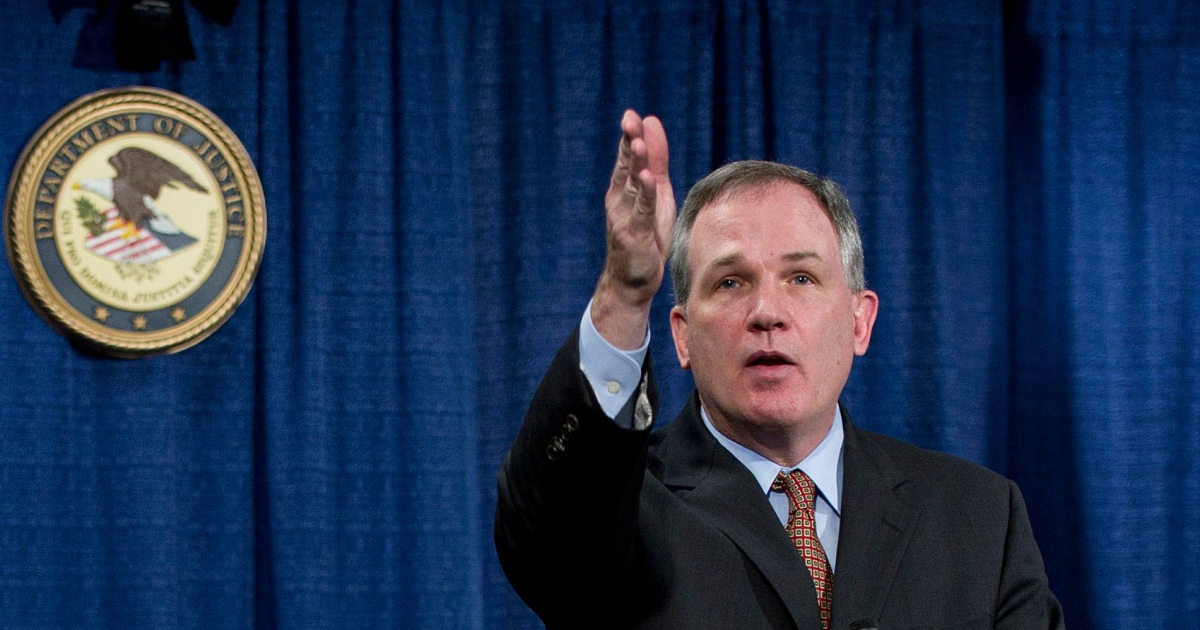In the run-up to former FBI Director James Comey’s indictment, there was no question who would step up to represent him: Patrick Fitzgerald, Comey’s longtime friend.
Source link
Sept. 27, 2025, 12:27 PM EDTBy Natasha KoreckiCHICAGO — In the run-up to former FBI Director James Comey’s indictment, there was no question who would step up to represent him.Friend and former colleague Patrick Fitzgerald, who served as U.S. attorney in Chicago for over a decade, would spring from retirement to be his man.Nationally, Fitzgerald is best known for his role as special prosecutor in the investigation into a CIA leak that brought charges against I. Lewis “Scooter” Libby.But to Chicago, Fitzgerald is something of a legend. The George W. Bush appointee left an indelible legacy as a scrupulous, hard-charging prosecutor who disrupted the kinds of crooked backroom deals that were long a trademark of Illinois politics.Over his nearly 12-year tenure as U.S. attorney for the Northern District of Illinois, his prosecutions took down the Chicago mob, put two consecutive governors — one Republican, one Democratic — behind bars and won a conviction against a top donor to Barack Obama just as Obama was running for the White House. He jailed longtime “untouchables” in Chicago and Springfield political circles while prosecuting international cases, including a Hamas funding scheme and major terrorism cases.Still in the Chicago area, Fitzgerald retired as a top partner at the law firm Skadden, Arps, Slate, Meagher & Flom two years ago and was enjoying spending more time with his family while doing some teaching. He’s entering the national spotlight to be Comey’s attorney out of longtime loyalty to a dear friend, those close to him say.But he’s potentially embarking on what could become a political firestorm. President Donald Trump made clear in his own social media post that he wanted his attorney general to bring charges against Comey.“Comey implicitly trusts Pat Fitzgerald. They’ve been best friends, or really good friends, for years,” said Robert Grant, former FBI special agent in charge of the Chicago office at the time Fitzgerald served as U.S. attorney. “They’re that close, and he also has a tremendous amount of respect for Pat.”When Fitzgerald landed in Chicago in 2001, he was dubbed “Eliot Ness with a Harvard Law degree.” But before that, he was the first to bring a case against Osama bin Laden — in 1996 — years before bin Laden masterminded the Sept. 11, 2001, terrorist attacks. It was one-term Illinois Republican Sen. Peter Fitzgerald (no relation) who recommended Patrick Fitzgerald for the post, at the time saying he wanted someone to lead the office who was unassailable and unafraid to root out public corruption.“Pat was out of central casting to be the incorruptible guy that was in aggressive pursuit of the facts and dispensing justice and vindicating the public’s right for honest government,” said Patrick Collins, a former federal prosecutor who led the case against former Gov. George Ryan, a Republican.“As a line assistant who was intensely involved in a prosecution and worked in an office that had a reputation for prosecuting without fear or favor, having Pat Fitzgerald as your boss — he had your back,” he added. “We always knew that cases would rise or fall on the facts.”Fitzgerald’s and Comey’s personal styles couldn’t be more different. For years, Comey has publicly clashed with Trump, who fired him during his first White House term. Most controversially, Comey held a news conference days before the 2016 presidential election to disclose new findings of an investigation into Hillary Clinton’s emails. Comey also frequently posts on social media — including a video on the day of his indictment vowing to take on Trump.Comey responds to indictment saying ‘I’m innocent’00:57For his part, Fitzgerald is unassuming and does not relish being in the limelight, those close to him say. Fitzgerald, an Amherst College and Harvard Law graduate, had “a steel-trap mind” when they worked together, Grant said, describing a photographic memory that would allow him to rattle off cellphone numbers of defendants years after prosecuting a case. But his demeanor was shaped by humble beginnings in Brooklyn, where he grew up the son of a hotel doorman.“There’s a little bit of hubris you see in Comey that you don’t see in Pat,” Grant said. “When you first meet Pat, he’s so down-to-earth that you don’t realize what a brilliant mind there is behind that genial exterior. Whoever that prosecutor is, she’s up against a damn good lawyer.”Lindsey Halligan, the new interim U.S. attorney in the Eastern District of Virginia, presented the case to secure Comey’s indictment on her own, according to a source familiar with the grand jury proceedings in Alexandria, Virginia, on Thursday. A senior Justice Department official told NBC News that career prosecutors in Halligan’s office sent her a memo saying they believed probable cause did not exist to secure the indictment.Trump tapped Halligan — who has no prosecutorial experience but was on his defense team in the Mar-a-Lago classified documents case — after the previous acting U.S. attorney left the position under pressure from the president to prosecute Comey.When he gained national exposure for prosecuting Libby, Fitzgerald became something of a media darling. He was sometimes referred to jokingly as “prosecutie,” according to one of his friends, and in 2005, much to his dismay at the time, he was named in People magazine’s “sexiest men alive” issue.The straight-laced prosecutor appeared visibly uncomfortable when reporters asked him about the designation at a news conference.“I almost enjoy going back to the leak questions I can’t answer,” he said at the time. “I played a lot of practical jokes on people for a lot of years, and they all got even at once. OK, new topic.”Fitzgerald’s investigations during his time in Chicago broke open a seminal case against the criminal organization known as the Chicago Outfit. Dubbed “Operation Family Secrets,” his office brought sweeping charges against more than a dozen mobsters and exposed evidence of 18 previously unsolved murders dating back decades. He also dug into Chicago City Hall, then under the longtime grip of Mayor Richard M. Daley. A massive investigation into an illicit trucking operation sent dozens to prison and exposed the underbelly of city corruption.Fitzgerald had plenty of detractors.Many of their criticisms stemmed from one of the highest-profile cases to come of his office: the prosecution of then-Gov. Rod Blagojevich. The yearslong investigation culminated in the stunning 2008 arrest of a sitting governor. Though several of his aides were already convicted of related crimes, Blagojevich, a Democrat, spoke openly on the phone — with the FBI listening — about how he could extract a personal benefit in exchange for naming the successor to what was then Obama’s vacant Senate seat.In one of the best-known lines of the case, Blagojevich was recorded relishing a potential payout from using his power as governor to name the next U.S. senator: “I’ve got this thing, and it’s f—–g golden.”Blagojevich was also later convicted of trying to shake down a children’s hospital executive for a $25,000 campaign contribution in exchange for an increase to pediatric reimbursement rates, as well as holding up action on a horse-racing bill while he illegally sought a $100,000 campaign contribution.In laying out the charges on the day of the governor’s arrest, Fitzgerald declared Blagojevich was on a “public corruption spree” that would make “Lincoln roll over in his grave.”Fitzgerald faced criticism for making extrajudicial remarks and potentially prejudicing a jury. For years, Blagojevich assailed Fitzgerald for bringing the weight of the office against him. Trump first commuted Blagojevich’s sentence, then pardoned him earlier this year.Then there was the Libby case, which involved extensive travel to Washington, D.C., while managing the Chicago office and its myriad blockbuster cases. According to law enforcement officials who worked under him, he never dropped the ball back home. At the same time, Fitzgerald drew national attention as he handled the investigation, which sought to uncover who leaked the identity of Valerie Plame Wilson, a covert CIA agent.At one point in the case, New York Times reporter Judith Miller was jailed for refusing to disclose her sources. Fitzgerald took heat from conservatives who called him overzealous in attempting to notch a conviction against Libby, who had served as then-Vice President Dick Cheney’s chief of staff. Bush commuted Libby’s 30-month sentence, and in 2017, Trump pardoned him, saying he had heard Libby was treated unfairly.In a statement at the time, Fitzgerald defended the prosecution, saying Libby “lied repeatedly and blatantly about matters at the heart of a criminal investigation concerning the disclosure of a covert intelligence officer’s identity.”Those who worked with Fitzgerald in Chicago defended him as zealously apolitical, noting he served under presidents of both parties. They held up his body of work as evidence he was no friend to those on either side of the aisle.“I worked with him for nine years. I have no idea if he’s a Republican or a Democrat, and it quite frankly never came up. He’s entirely about justice and doing the right thing,” said Eric Sussman, a defense attorney who worked as an assistant U.S. attorney under Fitzgerald.Sussman prosecuted a corruption case against onetime media baron Conrad Black, another high-profile defendant sent to prison in that era after he was convicted of diverting proceeds from his newspaper sales for his personal use. Like with Blagojevich, Trump would eventually pardon Black.“Pat really professionalized the office and made sure that everyone underneath him operated with the same professionalism, integrity and commitment to doing the right thing in Justice,” Sussman added. “That carried over not just to the attorneys in the office, but to how people in Chicago perceived him and perceived the office that he ran.”Natasha KoreckiNatasha Korecki is a senior national political reporter for NBC News.




